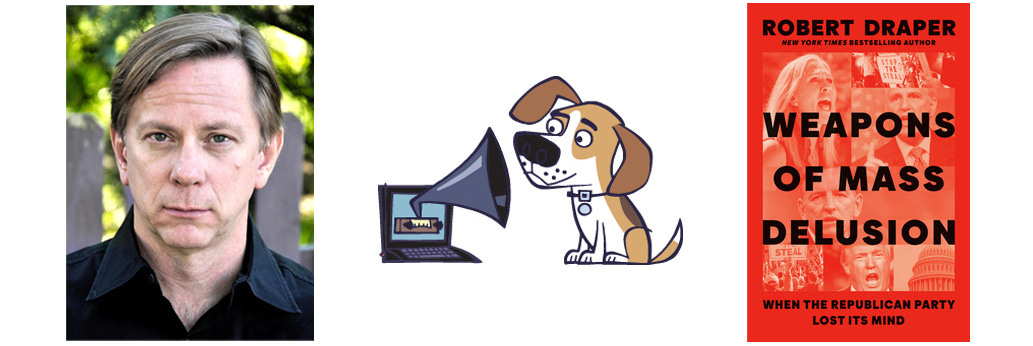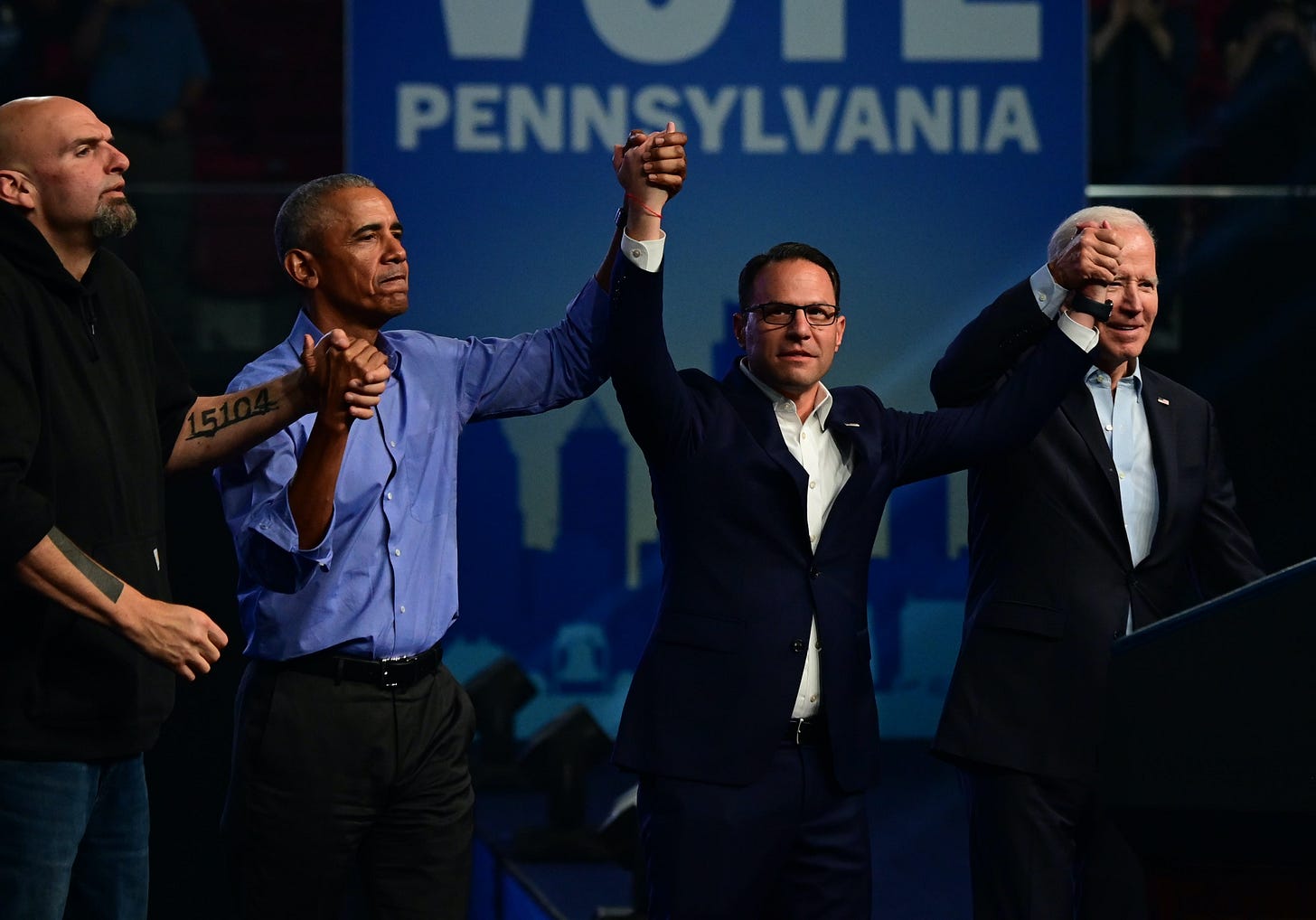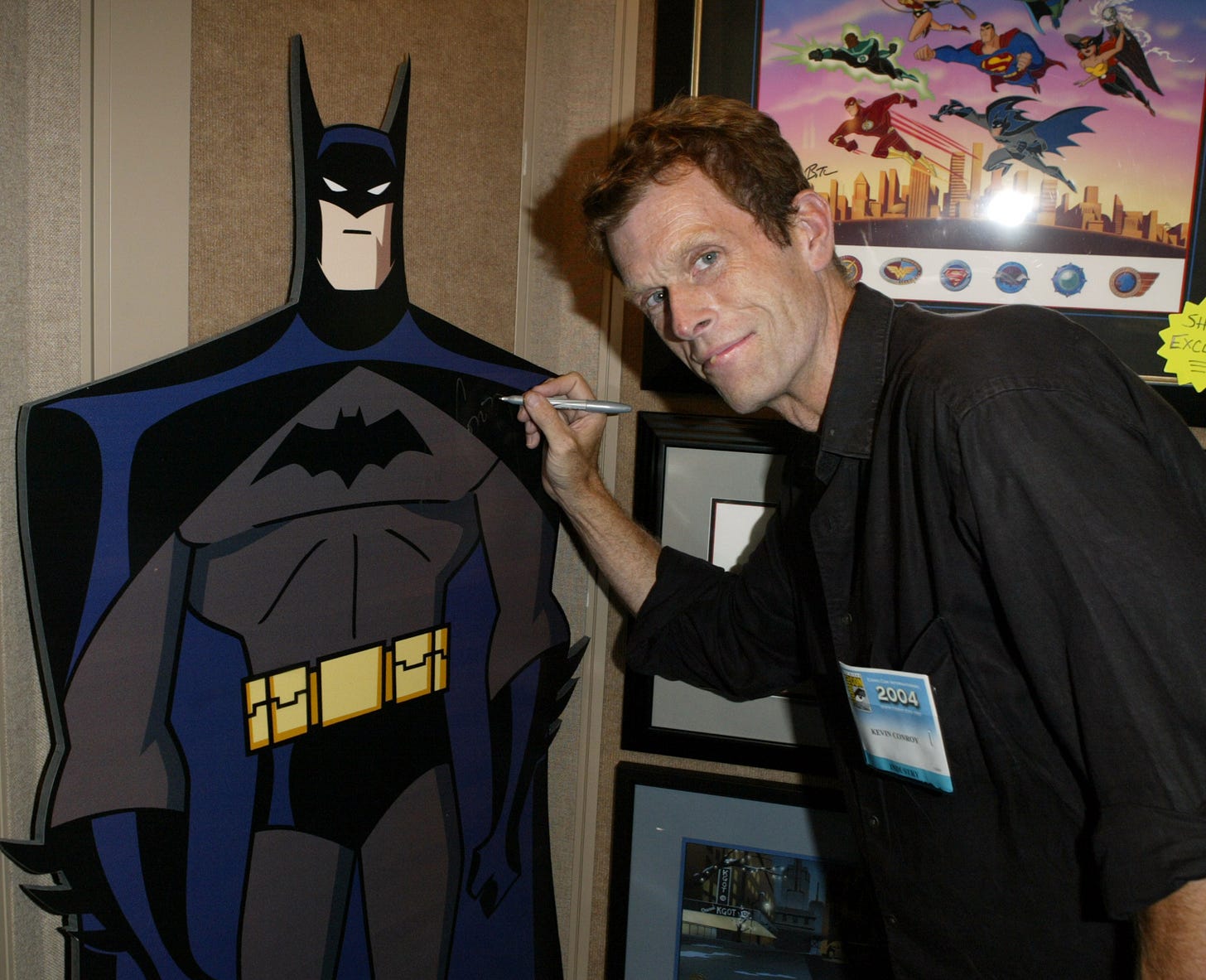Robert is a writer-at-large for the New York Times Magazine and a contributing writer for National Geographic. He is the author of several books, including Dead Certain: The Presidency of George W. Bush, and his new one is Weapons of Mass Delusion: When the Republican Party Lost Its Mind. He’s a friend and a prodigiously productive reporter who truly seems intent in finding out the truth — rather than spinning some ideological tale. And he was there on January 6.
You can listen to the episode right away in the audio player above (or on the right side of the player, click “Listen On” to add the Dishcast feed to your favorite podcast app). For two clips of our convo — on the MAGA supporters falling away from Trump, and on the rise of Majorie Taylor Greene — pop over to our YouTube page.
Other topics: the midterms, Trump vs. DeSantis, the epistemological collapse within our media bubbles, Tea Party hatred of moderate Obama, the growing diversity of GOP voters, our disagreement over the impact of CRT in schools, George W. Bush and the One Percent Doctrine, and the sheer careerism of GOP politicians.
Browse the entire Dishcast archive here. A listener “enjoyed your episode with Damon Linker”:
I always appreciate that you are willing to reassess your priors. I think you and Damon are right: it’s up to right-of-center primary voters to decide whether they want to continue aboard the Crazy Train Express. If they do, they are destined for more bracing losses for the next few election cycles among the general electorate. If they decide to sober up, however, and prioritize competence over grievance, humility over zeal, while harnessing some constructive populist energies on immigration, crime, education, and political economy, they could feasibly build a durable governing majority. I suspect the former is more likely, but who knows at this point.
Doubt is always essential in covering politics:
Another listener:
Damon is right about Trump’s support not being rational and more of an FU to the left. However, Trump has been losing support since the 2020 election. DeSantis has been gaining support this whole time and is now shown to be a winner with a broad spectrum of voters. Trump will lose to him as long as there aren’t a bunch of other people running. Lately Trump has just been completely unhinged attacking all the successful Republicans like Youngkin, DeSantis, and Kemp.
Damon is pessimistic about the ability of DeSantis to beat Trump:
One more listener on the episode:
I enjoyed your philosophical discussion as well as the political afterthoughts and forethoughts. In my view, the conventional views about Trump’s emergence are well established and correct: he raised issues (e.g., illegal immigration, trade policy, media bias) that were simmering but not meaningfully addressed by conventional politicians in either party. And he aggressively responded to condescension coming from the political/intellectual/media left that was deeply felt by a lot of Americans — a level of response that they had not heard from conventional pols. The constant attacks on Trump from the get-go only reinforced the attitudes of his base.
The question going forward is whether those attitudes are a forever thing. First, Trump now appears to present only one issue, himself, which he presents as a matter of loyalty. If enough diehards slowly come to the realization that he’s not about him fighting for them, but them fighting for him, does this diminish the glow?
Second, no great act lasts forever. Do his diatribes that succeeded against conventional Republicans like Jeb and Marco still work against politicians like DeSantis who push his ostensible issues more effectively than he has?
Third, Trump has painted himself into somewhat of a corner as a loser. His political sycophants have been obvious losers, while his Republican targets have done fine. Does there come a time when William Jennings Bryan morphs into Willie Loman? Just maybe Trump turns out to be as potent as Putin’s army.
None of this is to diminish the continuing capacity of Republicans to seize defeat from the jaws of victory. I find it comical that knives are out for Mitch McConnell but not for Rick Scott. Which one said that candidate quality is important? Which one gratuitously uttered the notion that Social Security and Medicare should be sun-setted? Per the old Yiddish wail, vey iz mir.
You can always send your own Dishcast thoughts to dish@andrewsullivan.com.
Next up, many readers continue to discuss my two latest columns, “Will Biden And The Dems Finally Get It?” and “The Normie Center Strikes Back.” The first:
I was one of your subscribers who’s been frustrated with your rants about wokeness, CRT, and ignoring how strongly women feel about the right to abortion (even after the vote in Kansas for heaven’s sake). But I did forget one thing: that when you’re wrong, you admit it. Which a whole lot of folks can’t or won’t do.
I remember when my 15-year-old daughter stopped going to confirmation classes (some 25 years ago). It was about the Church’s stance on abortion. I remember distinctly what she said: “I don’t think I could ever have an abortion, Mom, but who is the Church to tell a mom who already has four kids and can barely feed them, or a mom who might die during pregnancy, that she can’t make that decision with her doctor.” I realized then that even a 15 year old got it.
As she grew up, she felt the same way about gays and gay marriage — whereas I had to come around to understand both those things. I was a “good Catholic girl.” And I began to realize that her generation was growing up in a whole different cultural moment and was not going to quietly accept what had been the norm forever. So when the Supreme Court overturned Roe, I think I instinctively knew what would happen. Even conservative women were not happy and Kansas just proved it.
So thank you for continuing to be a grown up and admitting when you’re wrong!
Another disagrees:
Please don’t apologize for focusing on the impact of the far left as much as you have. As someone who also lives in a deep-blue area (Oregon) and works in a far-left environment (academia), I witness firsthand the far left’s depravities daily. We need people like you to speak up about them. Perhaps people with more “regular” jobs in more purple or red places don’t see what we see, and therefore they’re focused on other risks to our democracy, but you aren’t wrong to focus on the far left just because the American people didn’t repudiate the Democrats this time.
My mea culpa was not that I’ve been wrong on the substance of the woke revolution. It was that I overestimated its political impact at a time when other questions are dominant. It was a short-term political misjudgment, not a change of heart on the subject as a whole.
Another reader doesn’t want me to “draw the wrong lesson from this election”:
You wrote, “I was simply wrong to emphasize the impact of the far left as much as I have.” The impact on this election, perhaps, but the long-term impact and importance to the culture? Not to mention the hundreds of thousands of gender-confused young people you’re looking out for against these destructive zealots? Don’t lay down the sword. That fight is much more important than simply being an accurate electoral prognosticator.
I completely agree. I’ll keep at it. Another reader wants the Very Online to get some perspective:
I will applaud you for admitting that some of your continuing histrionics about Dem overreach was/is a bit histrionic. At least you recognize this because you live in the DC Beltway bubble. I lived in DC from 2001 to 2009, and let’s just say, during the Bush years, no one would have claimed DC was too far left. If anything, the Beltway operated like a purple state in many respects.
When my wife and I relocated to south Louisiana in 2009, it was eye-opening to see how vastly different living in a deep-red state is compared to the DC corridor, or even my home state of Colorado (which has, thankfully, trended towards purple/blue over the last 25 years). For all of your concerns regarding the “overreach” of CRT and trans-activism, these issues, by and large, aren’t the everyday concerns of your average conservative or liberal here in Louisiana, as far as I’ve noticed. They’re an “issue” for the bell-end of conservatives spending too much time online and watching Fox and Matt Walsh videos.
But a majority of Americans want a government that functions and is transparent at all levels. Everyone realized during Covid that having a functional government was a good thing to have. It’s a good thing to have when your area is devastated by natural disasters. Even small-c conservatives and independents in Louisiana understand that. We, thankfully, haven’t had any of the examples of “CRT/Wokism” creep in our schools, but I think that’s because they’re pretty much run by politically balanced school boards.
I watched as relatively centrist conservatives became more reactionary during the Obama years, and then when Trump came along, it went into overdrive with performative conservatism taking center stage. After the 2020 election, there were plenty of MAGA flags, Stop the Steal, and Let’s Go Brandon stickers, but when it came down to brass tacks, none of these people had answers on how they would have addressed all of the issues that came out of Covid. It was and is, a lot of dangerous bluster in many respects.
More midterm reflections from this reader:
I have friends in both parties. My friends on the right feel constantly aggrieved, insulted, and in general held in contempt by everyone on the left. My friends on the left feel worried, desperate, and in general bullied and mocked by everyone on the right.
My sense is that the most recent election turned on the fact that Republicans have primarily emotional concerns, animated and ignited by talk radio and talk television and what Adam Schiff in Colorado called “angertainment.” Although they were thrilled when Trump provided a temporary reprieve, they know that the culture will not change, that elites will continue to despise them no matter who holds office. Owning the libs is a genuinely powerful sentiment for them, but it has more pathos than ethos, like the cry of children who can’t hope to affect much in a world constrained by adult laws and rules.
But Democrats have more serious concerns, starting with the prospect of changed laws and rules. For women, abortion restrictions are a genuine practical emergency, a genuine immediate deprivation of freedom, and these legislated restrictions create an anxiety that other enlargements of freedom can be rolled back. And for Democrats the disobedience of law and rules represented by January 6 is a comprehensive emergency in waiting, all too real and ominous.
So in retrospect it seems no wonder that Democrats came out to vote in much larger numbers than expected. For them something very large and very adult was at stake.
Another reader looks ahead:
Your point is well taken here:
This leaves the Democrats with a huge opportunity. If they can find a candidate who can move to the cultural and social center on some issue or other (immigration, please!), and keep their economic leftism, the future is theirs. Their problem, of course, is that no credible candidate springs to mind — and 67 percent of voters in the exit polls oppose Biden running for a second term.
What about Josh Shapiro, the governor-elect of Pennsylvania?
I didn’t know much about Shapiro before election day, but I was pretty impressed by his election night speech. Having dug into him a little bit, he looks like he has the goods to be the next rising, center-left star of the Dems. He’s pragmatic yet progressive, avoids the culture war stuff, keys in on economic issues, and his “centering” issue seems to be law-and-order stuff (he publicly feuded with the uber-progressive DA in Philly and was backed by police unions in the election). This pragmatic progressive is keeping his fingers crossed that maybe Shapiro can be a moderating and yet energizing presence for the party.
This next reader stays on woke watch:
Hola Andrew, from Buenos Aires. The Pride Foundation in Seattle (my former employer, once known as a gay organization) recently posted this job opening: “We’re looking for our next Director of Programs: a community-oriented leader with a background in program design & implementation, philanthropy & grant-making, and experience working with QTBIPOC communities and ensuring intersectional racial justice is infused across programs and organizational systems.”
QTBIPOC! At least it’s honest in its complete erasure of gay men and lesbians. Another reader:
I figure this story in the NYT might stir some facepalming at Dish headquarters:
The boy had gotten the tattoo with his mother’s permission from a neighbor, according to local authorities. While some states have no minimum age for receiving a tattoo if a parent allows it, New York State forbids anyone younger than 18 from getting tattooed with or without parental consent. Last month, both the tattoo artist, Austin Smith, 20, who was unlicensed, and the boy’s mother, Crystal Thomas, 33, were arrested, as pictures of the boy’s arm stirred outrage across local and international news sites and social media.
Apparently the issue for the NYT is more about “millennials,” “boomers,” and “societal mores” rather than, oh I don’t know, arresting two people for a tattoo:
It is a situation that Dr. Cora Bruener, a pediatrician and professor at the University of Washington Medical Center’s Seattle Children’s Hospital, and author of guidance on tattoos for pediatricians, issued by the American Academy of Pediatric Medicine, finds troubling. “It is a permanent mark or a symbol you are putting on your body, and I don’t think kids under 18 have that kind of agency to make a decision,” Dr. Bruener said.
This is a remarkable paragraph for the NYT to print given its current stances on gender reassignment.
Here’s a quick followup from the reader who flagged the Joe Rogan episode last week:
That clip you posted is a good one, but unfortunately they left out the best part of the debate over gay marriage. The time-stamps for the strongest part of Rogan’s argument are from 2:29:40 - 2:31:05 in the Spotify episode if you get a chance to listen.
From a normie gay:
I saw Bros myself about three weeks ago and I wanted to tell you what I thought about it. Although I thought parts of it were very funny, I really disliked the main message of the film. I felt the film was trying to hammer across a message that people choose a “good way” or a “bad way” to be gay by contrasting the lives of the two main characters. In reality, it is an individual’s innate character that greatly influences his behavior. And I found Bobby’s character to be completely unlikable. Throughout the film, I found him objectively rude, loud, and obnoxious. Despite this, the film constantly tries to get the viewers to sympathize with him. I left the theater with a headache and the idea that I’d rather eat broken glass than be in a relationship with a man like him.
Let me tell you a bit about myself: I’m a center-left Bill Clinton Democrat from Connecticut. I am an older Millennial. I came out when I was 16 and I’m now 41. But I’ve never had a boyfriend. I went through four years of university and some heavy partying but didn’t become sexually active until I was in my mid 20s. I felt like I met a lot of bad guys who had a fear of commitment or constantly flaked out on me when I tried to go out with them. When I was 29, I even drove an hour one way for a date with a guy who stood me up and lied about the reason why he didn’t show.
By the time I reached my early 30s, I stopped having sex and this was mainly by choice. I go to Provincetown every summer and I joke with friends that I am probably the only gay man in North America that can spend a week there and not get laid. The reason why is, I realized if I had sex without a commitment, most men would view me as dispensable. So, I decided I would not have sex without knowing them for at least four months, because I want them to show that they have some sort of time investment in me as a person. I don’t view myself as disposable and I see myself as someone to be valued and cherished. The decision has killed my sex life, but I don’t regret the decision for a nanosecond. It has made me feel much more respectable and I feel it’s smart of me to not be sexually active until a man puts an effort into showing he cares about me as a person.
I feel the root of my dating problem is I have very little in the way of romantic chemistry with the vast majority of men I meet. I feel that most gay men, especially in the US, place great importance upon being extroverted, socially popular, and gregarious. I am the polar opposite of that, and I am turned off by men who are emotionally expressive and love to socialize. I am introverted and emotionally distant, and I am attracted to men who are quiet and laidback. I don’t meet any gay men with that kind of personality. There is nothing wrong with being extroverted, but I don’t have any chemistry with that kind of personality.
Lastly, a short reader tribute to an impressive guy:
You may not have heard about the passing of voice actor Kevin Conroy, who voiced Batman in animated entertainment for decades. Here are some details that will likely interest you and your readers:
Conroy is survived by his husband, Vaughn C. Williams, sister Trisha Conroy and brother Tom Conroy.
In Finding Batman, released earlier this year, Conroy penned a comic about his unlikely journey with the character and as a gay man in Hollywood. “I’ve often marvelled at how appropriate it was that I should land this role,” he wrote. “As a gay boy growing up in the 1950s and ‘60s in a devoutly Catholic family, I’d grown adept at concealing parts of myself.” The voice that emerged from Conroy for Batman, he said, was one he didn’t recognise — a voice that “seemed to roar from 30 years of frustration, confusion, denial, love, yearning.”
Rest in peace.















